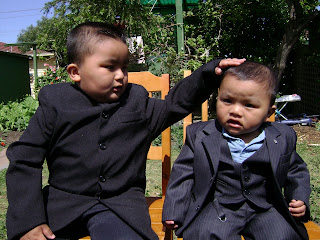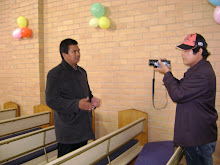By Jessica Lim
A few nights before Christmas, villagers in the mountains of Chin state of Mayanmar would step out into the biting cold , wrapped in thick woolen blankets.
The fames from large, sun-dried bamboo would flickering lights on the happy faces of the men, women and children who had gathered for the year's biggest celebration.
Tuman, 35, had a farwaway smile as he recalled how they would sing Christmas carols at every house in exchange for small gifts, like a comb of banana or a parcel of rice.
"We would reache the last house at two or three in the morning. Then we'd go home and have hot chicken soup," he said.
In a jungle about 40km Kuala Lumpur city centre, where Tuman and about 150 other Chin refugees now live, the Christmas spirit is palpable.
This year, they are celebrating the birth of Jesus, the way they used to in their homeland - in the open and freely.
The United Nations Refugee agency estimates 7,000 Chin refugees in Malaysia, of whom a third live in jungles near construction sites where they work.
This makes them the third largest group of refugees, after the Acehnese from Indonesia (20,000) and the Rohinghyas from the northern Rakhine state of Myanmar (10,000)
Bubu, a 35 - years old single mother, said her Christmases the last few years in Myanmar before fleeing here in 2003 were spent peering out windows to see if the military would show up.
"How to celebrate? We didn't have any "mood" to plan anything. Christmas was the best time of my childhood, but my children have never experienced it," she said.
Her four children are still in Chin state. When she spoke of them, her hubbly countenance turned sad.
To earn a living here, she embroiders traditional Chin motifs on the table cloths for sale. Every sen saved, she says, will be used to bring her children over.
She ran her finger lightly over an embroidery pattern depicting a man hungting deer in the jungle.
Hunting is a big part Christmas celebrations in Chin villages.
"All the men would go out four or five days before Christmas and hunt for deer or wild boar," she said.
"Sometimes they would come back with five or six! Then we'd cook great pots of soup and eat together.
At the Welcome Community Home in Batu Arang, Hnen (not his real name) 29, stretched his arms as wide as they could go.
"The pots of soup were so big! It was flavoured only with salt, but it was the best soup ever," he said with a bright smile across his tired face.
Hnen is HIV positive. Knowing his time is short, his one wish is to send money to his parents and two sisters in Myanmar.
When asked his favourite Christmas memory, he closed his eyes while a hint of a smile played on his lips.
"When Christmas come, it's very cold.You know cherry blossoms trees? I like to look up at the falling blossoms and the blue sky beyond.
"That's what I miss most about Christmas."
Women make up 13 percent of the Chin refugee population in Malaysia. Many are single mothers with the burden of risaing their young ones in a foreign land. A major challenge is the lack of access to medical care and education.
Mai Sabeh, 33, is heavily pregnant. There is a chance the baby, her first child, will be born today - on Christmas day.
Although her husband is in an immigration detention centre and she's not sure how she'll support her baby, she keeps herself buoyant with the knowlegde that things will soon change.
Her family will be resettled in Australia soon, which Mai Sabeh says, is a Christmas wish come true. Resettlement is the best solution for many Chin refugees here.
They may not be able to return to Myanmar just yet but it is every Chin person's desire, said Alliance of Chin Refugees chairperson Zotung.
"In Chin State we walk four or five hours to rice fileds to work sometimes, and eat pork only once a year during Chritmas."
"Life is hard at home, but my greatest wish is for peace so we can return," he said.
Zotung was reunited with his wife and eight-year old son last year after seven years separated.

